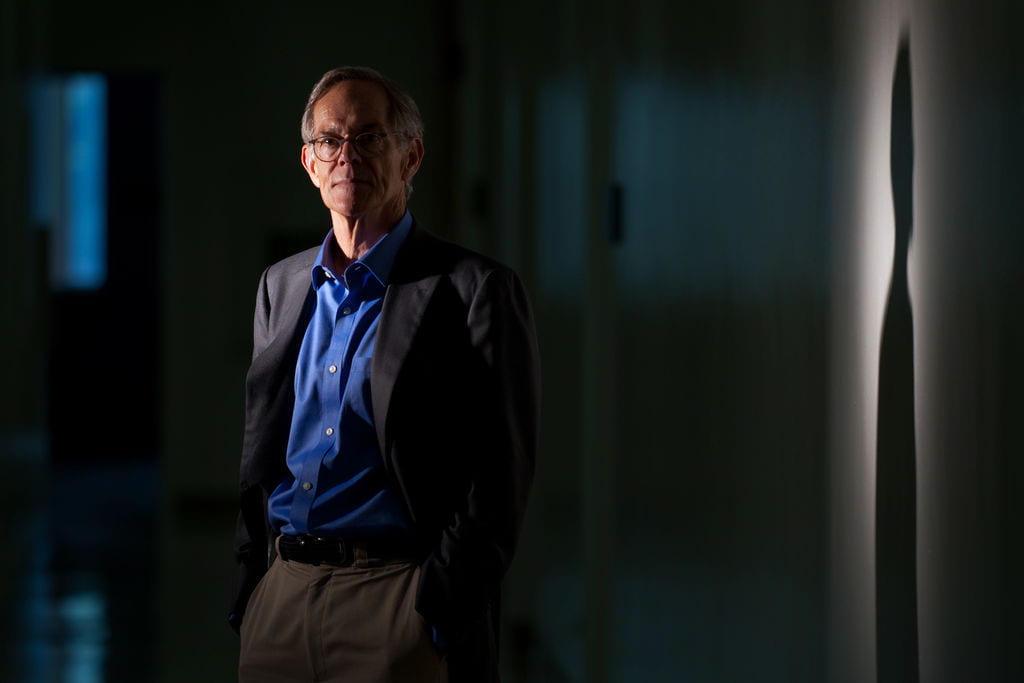Academic Senate leader takes reins
Dr. Alan Barbour, professor of medicine and microbiology & molecular genetics, is new Academic Senate chair.

Dr. Alan Barbour hasn’t picked an easy time to chair UC Irvine’s Academic Senate. But threats to what he sees as the world’s best public university are why he ran for the office, which makes him UCI faculty’s lead voice on UC governance. His one-year term begins this month.
“I want to represent the Irvine campus at a time when our interests are at risk,” says Barbour, professor of medicine and microbiology & molecular genetics. “I believe many faculty still may not be aware of the critical decisions to be made in the next year or two that will affect the future of the entire University of California.”
Proposed changes to retirement benefits top the list. Barbour takes the long view. Until last year, faculty and other UC employees hadn’t contributed to the pension fund for nearly 20 years. As public money evaporates and costs swell, they could be asked to contribute ever higher percentages of their salaries.
Barbour is concerned about that but also fears many professors will want to keep their own benefits intact while reducing them for future hires. He says that could erode a great advantage the UC system has had in attracting world-class faculty.
“There’s this tendency to just serve the present,” he says. “But we can’t just say, ‘We’ll take what we’ve got coming to us, and to heck with the future.’”
A Newport Beach resident who came to UCI 14 years ago, Barbour, 64, is
no stranger to tough tasks. He cracked the mystery of which bacteria
causes crippling Lyme disease and heads a federally funded infectious
disease research center that includes scientists across the Southwest.
At senate offices in Aldrich Hall, Barbour ticks off other consequences
of budget cuts, including bigger classes, fewer lecturers and
difficulty replacing top-notch faculty.
UCI officials agree that the UC system is at a pivotal point and say Barbour is an ideal choice to represent the campus.
“Particularly at this critical juncture in the university’s history,
it’s important to have leadership like Alan’s,” says Michael
Gottfredson, executive vice chancellor & provost. “We’re embedded
in the worldwide recession, and the university doesn’t escape from the
implications of that.”
He says Barbour, who has chaired both universitywide and UCI councils
on academic performance, brings strong experience and a level head to
the post: “Alan is a pleasure to work with; he’s a very serious and
agreeable individual.”
Chairing the senate also means presiding over campus cabinet meetings
and serving on an array of committees. There’s even a committee on
committees, which nominates people to other bodies. Barbour sees it all
as a necessary part of a refreshingly open decision-making process. He
is heartened that the University of California, unlike others he’s
worked at around the country, includes its faculty in “shared
governance.”
“To an outsider, it may not be as efficient or nimble as a top-down
process, but over the long haul, it’s much better,” he says. “It’s what
helps make this the best university in the world.”
Barbour believes his experience chairing various peer review panels
will serve him well. Less than a third of all faculty members voted in
the last election. Barbour is aiming to energize and involve the silent
majority in decisions that could affect the university’s future.
Anyone with an academic appointment at the university is part of the
senate, he notes, and certain faculty members who participate regularly
are strongly opinionated speakers.
“It’s like herding cats,” Barbour says calmly. “I kind of like that – the ability to have people come to some consensus.”
Faculty can contact Barbour confidentially at chair@uci.edu